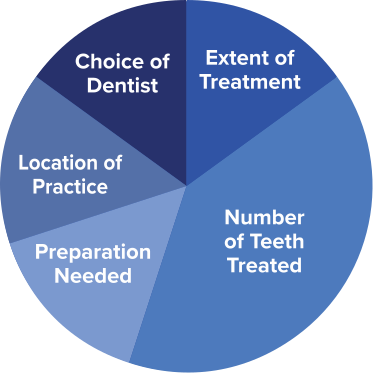The Cost of Dental Bonding
Dental bonding costs about $100 to $400 per tooth, making it an affordable way to address minor cosmetic concerns. The final cost of your treatment will depend on the number of teeth being addressed, your goals for treatment, and your location. Dental bonding is a less expensive option than porcelain veneers, making it an accessible treatment for patients who want to instantly transform their smile on a more conservative budget.
Cost of Dental Bonding vs. Porcelain Veneers
Dental bonding is a less expensive option than porcelain veneers, making it an accessible treatment for patients who want to instantly transform their smile on a more conservative budget.
Dental bonding remains a popular cosmetic dentistry option because it is relatively inexpensive but still produces dramatic results. Similar to porcelain veneers, dental bonding can transform the brightness, size, and shape of a tooth. However, rather than using hand-layered porcelain manufactured in an outside lab, your dentist can mix composite resin in the office, saving both time and money. In comparison to dental bonding, veneers typically range from $800 to $3,000 per tooth.
Factors Affecting the Cost of Bonding

The cost of bonding is impacted by the location of your dentist’s office as well as the extent of treatment.
Elements to Consider When It Comes to Cost
While the cost of bonding varies from patient to patient, there are several factors that will largely influence the total cost of your treatment. These include:
- Number of teeth being treated: Treatment for several teeth will cost more than a single tooth.
- Size of treatment area: Filling in a small section of a tooth will cost less than resurfacing an entire tooth.
- Additional treatments: Complementary treatments can increase your expenses. If bonding is being incorporated into a smile makeover, talk to your dentist about potential discounts for bundled treatments.
- Location of the office: Dental offices located in larger metropolitan areas often have higher treatment costs.
- Experience of the dentist: Though a highly reputable dentist may charge more for their services, they can help ensure you achieve your desired results without complications.
Protecting Your Investment
Composite resin is durable but there are certain precautions you can take to keep your smile looking healthy and radiant. You should refrain from:
- Biting your nails
- Using your teeth to open packages
- Smoking or using tobacco
- Consuming large amounts of dark foods and drinks such as coffee and berries
Patients who grind their teeth should also ask their dentist about protective measures. Mouth guards and splints can prevent your teeth from touching, and in turn, from excessive wear and tear.
Financing Your Treatment
As dental bonding is often considered an elective cosmetic procedure, it is generally not covered by insurance. However, if treatment improves areas of the smile that are compromised by decay or damage, insurance may provide partial or full coverage. Many dentists also work with third-party lenders, such as CareCredit®, who offer flexible financing with low-interest to make treatment more accessible.
